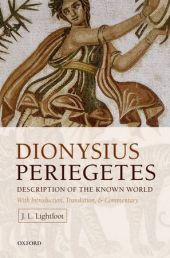 Neuerscheinungen 2014Stand: 2020-02-01 |
Schnellsuche
ISBN/Stichwort/Autor
|
Herderstraße 10
10625 Berlin
Tel.: 030 315 714 16
Fax 030 315 714 14
info@buchspektrum.de |

J. L. Lightfoot
Dionysius Periegetes
Description of the Known World With Introduction, Text, Translation, and Commentary
2014. 596 S. 6 maps. 236 mm
Verlag/Jahr: OXFORD UNIVERSITY PRESS 2014
ISBN: 0-19-967558-9 (0199675589)
Neue ISBN: 978-0-19-967558-6 (9780199675586)
Preis und Lieferzeit: Bitte klicken
A detailed study of a geographical poem by Dionysius, a scholar-poet who flourished in Alexandria. The introductory essays discuss the poem´s place in the literary context of ancient geography, focusing on its language, style, and metre, and the commentary is supported by a fresh edition and English translation.
In this volume, Lightfoot offers a detailed study of an ancient Greek geographical poem by Dionysius, a scholar-poet who flourished in Alexandria during the reign of Hadrian, which describes the world as it was then known. In antiquity, it was widely read and extremely influential, both in the schoolroom and among later poets. Translated into Latin, the subject of commentaries, and popular in Byzantium, it offers insights into multiple traditions of ancient
geography, both literary and more scientific, and displays interesting affiliations to the earlier school of Alexandrian poets.
The introductory essays discuss the poem´s place in the literary context of ancient geography, focusing on its language, style, and metre, whereby Dionysius shows himself a particularly painstaking heir of the Hellenistic poets, and illustrates how intricately he interlaces sources and models to produce a mosaic of geographical learning. Particular emphasis is given to Dionysius´ place in the ancient tradition of didactic poetry, and to his artful manipulations of ancient ethnographical
convention to produce a vision of a bounteous, ordered, and harmonious world in the high days of the Roman Empire.
The commentary, supported by a fresh edition and English translation, discusses Dionysius as a geographer but, above all, as a literary artist. This volume contributes to the revival of interest in, and appreciation of, imperial hexameter poetry, and brings to the fore a poem that deserves to be every bit as well-known as its Hellenistic counterpart, the Phaenomena of Aratus.
Lightfoot has given us a new edition aimed at those "others", that is, at readers and scholars of poetry ... with an extensive introduction and commentary , making it clear throughout that she take the Periegesis seriously as a work of literature, not merely an artfact of geographic history. James Romm, The Times Literary Supplement


